15 YEARS WITH PULMONARY HYPERTENSION
Tess looks back on her journey















15 YEARS WITH PULMONARY HYPERTENSION
Tess looks back on her journey














Thisissue is packed with news of kind souls who have chosen to support our charity through fundraising. From running and cycling the length of the UK, to knitting sales and sponsored skips, we’re constantly amazed by the efforts that people make.
We’ve included as many fundraising stories as we can in this issue, and there’s plenty more going on over the summer months too. In fact, as I write, 50 employees from a company in London are preparing to walk a marathon around the capital in support of a colleague’s wife with PH.
We get no government funding, so acts of kindness like this enable us to continue our work – and we are truly grateful to everyone.
Aside from fundraising, there are many other ways to support us too, and taking part in our research activities is one of the most important.
I’d like to say a personal thank you to everyone who has taken the time to complete the two important surveys we have distributed over the last few months.
At the time of going to print, What does it mean to live with PH today? and Understanding more about PH and nutrition have been completed by over 1,400 people combined.




The value of your voices cannot be underestimated, and we look forward to bringing you the findings - and details of the difference they will make - very soon.

Enjoy the summer (and don’t forget the sunscreen!)
Iain Armstrong Chair of the PHA media@phauk.org
media@phauk.org
UK
Welcome to the summer issue of Emphasis. I hope that wherever you are reading this, the sun is shining in more ways than one.
THE VALUE OF YOUR VOICES CANNOT BE UNDERESTIMATED







Why
Member Tom on being a husband and father with PH


“Everything that I’m doing is
Little phighter Hollie
Beattie has been busy with horse riding and ballet lessons, showing that PH won’t hold her back from what she enjoys. Sharing a video from a riding lesson on Instagram, her mum Marion said: “Hollie has had to face things recently with her health that most adults would find hard, and that no kid should ever have to. Tonight I watched her ride better than she’s ever ridden, with absolute determination. I’m so proud of this little warrior.”
Marion also sent us this photo (right), telling us: “In September 2021, Hollie started ballet. She took her grade one exam in May 2022 and was awarded a higher merit. She’s in the picture with her Dad Gary and brother Ethan.”

We love to celebrate the achievements of the little phighters in our community. If you want to let us know how your little one is inspiring you, email details and a photo to media@phauk.org You could see them in the next issue of this magazine, or on our social media channels!
We’re planning an exciting new research project, to understand what can change during a year of having pulmonary hypertension.
PH365 will follow a cross-section of patients and their loved ones for 365 days, measuring clinical fluctuations, quality of life, disease changes and more. This project will help medical professionals - and others - to truly understand what life is like for people with PH outside of the clinic.
Research will begin at the start of 2024 and there will be many different ways to take part, with varying levels of involvement. We will be looking for individuals with PH and loved ones / carers too who are willing to complete questionnaires, engage in telephone interviews, complete video diaries,
or share their thoughts over the course of the year. Other methods of involvement will be developed, and we plan to include children with PH in this study too.
To register your interest, please scan this code with your mobile phone or head to www.bit.ly/PH_365 to complete the form and we will contact you with more information.

Our annual awareness campaign PH Day UK will take place this year on Friday 3rd November. Pop the date in your diary and keep an eye out for all the ways you can get involved!
The PHA UK logo has had an eye-catching update, and we hope you love it as much as we do!
The design has been modernised to suit increased usage online, and the addition of the arrow reflects our charity’s mission to keep driving forward ways of supporting people with PH. There will be a phased introduction of the new logo, so you might still see the old one on some of our materials for a while.

A PH support group is holding regular meet-ups in Cambridge for anyone affected by the condition.
Organised by Mel Lee, head of the patient support group at Royal Papworth Hospital, the informal gatherings are for everyone – regardless of which specialist centre you attend. Family, friends and
carers are all welcome too. Meet-ups take place every three months (the photo shows the first one earlier this year), and there are plans to introduce online gatherings too, so that even more people can get involved.
For more information, please contact Mel at pulmonary.hypertension@outlook.com
We’re always looking for new people to join our Feedback Forum and Research Forum to help guide our activities or contribute to important research work.
Your thoughts and contributions can all be shared from the comfort of your own home, and we need carers and loved ones, as well as people with PH, to be part of these groups.
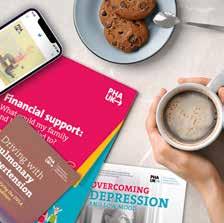

Find out more about our Feedback Forum at bit.ly/PHAUKfeedbackforum
Find out more about our Research Forum at bit.ly/ResearchForum_PHAUK

Earlier this year, we asked our social media followers to send us a photo that made them smile, with the winner to be used as our Facebook ‘banner’ image throughout May. The entries were so good that our chair, Dr Iain Armstrong, chose three – and we couldn’t resist sharing even more of them here.

“This represents what I believe I should do every day whilst enjoying a brew”
 Lou Chadburn
Lou Chadburn
“I did a solo trip to Disney World and I pulled the sword from the stone so technically I should be the next ruler of England! I was diagnosed with PH in 2016 and I now travel solo regularly.”

Victoria Sant
“Darcy, our 11-year-old westie”

Jayne Venables
A “This makes me smile.”
Nic McCulloch
B “Ruby and Billy, my grandchildren. The reason I get up in a morning and why I will fight for every breath to see them grow up.” Paula Hartley

C “This photo makes me smile because it represents that when you enter into darkness, the light will come and the darkness will fade.”
Leanne ParsonsD “One of the things that makes me smile is watching the sunset at our local Brixham Harbour” Emma
Thank you to everyone who submitted images. Every single one made us smile!


Our private Facebook groups are a valuable source of support and advice from people who truly understand. Each group has a strict screening process to ensure those requesting to join are genuine, so you can be confident of privacy. They are safe spaces to talk to other people with similar lived experiences.


This is our original forum, which now has almost 2000 members. It’s a very active group, with responsive members who offer advice and support at all times of the day and night.

Join here: www.facebook.com/groups/125342770826215


This forum is exclusively for family members, loved ones, and anyone who provides care or support for someone with pulmonary hypertension. Set up in 2021, it is growing to become a valuable source of connection.
Join here: www.facebook.com/groups/402808577486104



This group was set up by PHA UK members with our support. It is a safe space for families and friends to support each other, share their experiences, feelings and memories – and connect with others that have experienced loss due to PH.


www.facebook.com/groups/215307796620821
You need to have a Facebook profile in order to join these groups. Sign up at www.facebook.com – it’s free and easy!
Meet Harry Mackinnon, the 10 -year-old who honoured his grandad 's memory by cycling 100 miles for our charity during March. And he didn't let the Scottish snow stop him...

Harry chose to cycle the distance between his home in Insch and Perth, where his grandad Brian Robertson was originally from. He pedalled in stages throughout the month, and when winter weather made cycling outside impossible, determined Harry simply jumped on his grandma’s indoor spin bike instead.
Q. Hi Harry! Why did you decide to take on this challenge?
A. Because I like to help charities and help make a little difference.
Q. Can you tell us about some of the weather you faced?

A. I did have some sunny days but mostly rain, hail and snow.
Q. What was your favourite part of the challenge and why?

A. I enjoyed all of it and when my friend came out on his bike with me.
Q. What was the hardest thing?
A. The hills! We live in quite a hilly village but the downhill was good fun.
Q. How do you feel now the challenge is over?
A. Tired - haha! But happy because I've raised so much money. I think it's great and I'm really happy and thankful that people donated.
Q. What are your favourite memories of your grandad?
A. My grandad was a great person. He was funny, kind and loved us all so much. Because of his illness he wasn’t able to do lots of things with us but he did have a great stash of sweeties. My favourite memories are when he taught me how to play chess and how funny he was!
Harry collected £450 in sponsorship, with £80 in Gift Aid taking his total to over £500!

“We are so proud of Harry, he's had some pretty rubbish weather but he's done it and I know my dad would be so proud of him!” - Kirsty Mackinnon, Harry’s mum
Here at the PHA UK we’ve partnered with psychology researchers at Cardiff University and Nottingham Trent University to trial a new self-help programme aimed at supporting people with pulmonary hypertension to manage their depression.


We are looking for adults with PH who feel they have low mood or depression to take part in this important study to test the effectiveness of a series of self-help booklets. Once the study is complete, the aim is to then make the programme available to all.
Depression is a term used to describe a range of symptoms or difficult experiences like low mood, feelings of hopelessness, negative thoughts, difficulties with concentration, fatigue and tiredness.
Research has shown that up to 58% of people with PH live with depression, and this programme has been designed specifically for these individuals. It is the first programme of its kind to specifically help people with PH in this way.


First, you will be asked to complete a series of questionnaires to help us understand if the programme is suitable for you. If it is, you will be assigned to one of two groups at random.
One group (known as the ‘intervention group’) will receive the self-help booklets, which are based on Cognitive Behavioural Therapy (CBT) –one of the most effective therapies for depression.
ThisserieswaswrittenbyDrGreggRawlings, AbbieStark,DrJamesGregory,DrIainArmstrong andProfessorAndrewThompson
If the booklets are found to be helpful, the other group (known as the ‘waitlist’ group) will receive them at a later date. This is so the two groups can be compared, to see if the programme makes a difference.
The intervention group will be asked to work through four booklets over four weeks, in their own time at home.
The booklets include information about PH and depression and how the two can interact, and lots of strategies and techniques to help you better understand and manage symptoms of depression and low mood.
This is your opportunity to help yourself and others by taking part in a promising new research study
The booklets have been reviewed by a panel of people living with PH, to ensure they are relevant and as helpful as possible.
Both groups will be asked to complete questionnaires online, for researchers to understand how effective and helpful the programme has been. These will be completed by both groups when you sign up to the study, four weeks later, and again in one month.
Those in the intervention group will also be contacted two weeks into the study to provide feedback on how they are finding the booklets, and again at the end.
If the study shows that the booklets are effective, we will then make them available to participants in the waitlist group. After this, the programme will be made available to all PHA UK members. This is exciting as it would be the first self-help study to provide support for people with pulmonary hypertension and depression.
Who can take part in the study?
We’re looking for people who:
• Are over 18 years old
• Have a diagnosis of pulmonary hypertension
• Are able to read and write in English
You do not have to live in the UK to take part in this study, and you do
A similar study, conducted in 2020, set out to test the effectiveness of workbooks for people with PH experiencing worry or anxiety. This resulted in the self-help programme being made available to all, and it has now helped over 120 people with PH enjoy a better quality of life.

Find out more about this programme on page 26.
not need to have a formal diagnosis of depression. If you feel you have depression, or you struggle with low mood, we encourage you to apply.



Unfortunately, the programme is not suitable for people experiencing thoughts of self-harm or suicide.
If you are experiencing these types of thoughts, please contact your GP immediately.
To apply, please visit www.bit.ly/DepressionAndPH or scan the code below with your mobile phone, before the end of this year (2023). You will be asked to complete some questionnaires online, to ensure you are suitable for the study. If you have any questions, please contact lead researcher Abbie Stark at starkas1@cardiff.ac.uk
If you are having difficulties with low mood or depression and do not fit the criteria for this study, please email us at support@phauk.org and we will guide you through the support that is available.

Raya Mynot has had PH since she was a baby and has had to explain her condition to many different people over the years. In her latest column for Emphasis, the 21-year-old reflects on the multiple conversations and how they have changed throughout her life.


Having PH has, of course, had a pretty big effect on everyday life. Things become more challenging, they can take more time, and sometimes just can’t be done at all. This is why it’s really important for me to make people who come into my life aware of my PH.
As a child I definitely didn’t have to do this as much as I do now in adult life; mostly because as a child I was still learning my boundaries and limits, and just tried to always join in with everything.
Other children also didn’t take a lot of notice if there was something I couldn’t do, or had to sit out of, as long as they were having fun and their minds were occupied.
I think as a child I was also more oblivious to it all; I didn’t understand the seriousness, and being out of breath sometimes was just normal for me. It was only as I got older that there was a lot more I couldn’t do, or had to take time doing.

In high school I had a team of teaching assistants who knew all about my condition and would help me during the times I was at school. I was also lucky to be able to spend time in a quiet area for SEN (Special Educational Needs) pupils, which was really nice as it meant I didn’t have to worry about keeping up with friends in the playground.
During GCSE years I did spend more time outside with friends. They already knew I had to take things slow and got out of breath
easily, but I never really told them a lot because all the time I was in school, the teachers knew to look out for me and knew if I wasn’t feeling great.
When it came to me attending college, I did have to make my friendship group more aware, as we were going out more often and I used to like meeting up with them outside of college.
I think as we were all older and becoming young adults, they took the news very well. Most of them all got my mum’s number so if anything was to happen, one of them would be able to call straight away.
I was really lucky to have a group of friends who accepted my PH but also didn’t treat me any different from the others. I think they also loved the perk of always being dropped home by my mum after we’d been out because public transport was often too much for me to manage!

New conversations came again when I started working. I got a job in a nursery that was actually based at my college, which was really handy as it had a car park so I didn’t have to walk far.
Before working there, I had an interview with the mangers and told them all about my PH and other health problems. They were so accommodating and made me feel really welcome.
If I spend a lot of time in one place, I have to keep a spare oxygen cylinder there just in case. So, my mum had to go in and show them all how it worked in case there was ever a time I needed it. This was then kept in their office. I also wear a medical alert bracelet on my right wrist. Every member of staff I worked with was made aware of that, and in
case of emergency they could let people like the ambulance service know it was there.
It has all my health conditions on and also a number for my parents if anything was to happen. It also helped a great deal when they filled out any forms for me, as they could get all the spellings right!
I really enjoyed it at the nursery and felt very at ease there. I wasn’t treated any differently to other members of staff either which was really nice. Sometimes if it got too cold out in the playground, I was able to switch with someone who was in the baby room so I could stay inside.
Having to tell people about my PH can be really nerve-wracking, but it’s almost a relief once I’ve done it. It also makes me worry less about being away from my mum if the people around me know!

Having to tell people about my PH can be really nerve-wracking, but it’s almost a relief once I’ve done it.
It’s the most prescribed treatment for pulmonary hypertension, but the origins of sildenafil may just surprise you. Consultant Pharmacist Neil Hamilton fill us in…
Ihave mentioned in previous Emphasis articles how well connected the PH community is here in the UK, and the subject of this column provides another example of this.
The PHA UK office receives many questions from members on every aspect of living with the condition. These may be in person, via emails, phone calls or the highly valued ‘Listening Line’ service [see p48 for details].
The office team always answer your queries and offer the best advice, but clinical questions may need to be answered by a clinician – so the team know they can easily refer the query to one of the UK’s specialist centres.
This is the case here, when they spoke to me about this issue of Emphasis, having had a number of members asking questions on the same theme. Coincidentally, our pharmacy team has also taken two queries, only this week, asking for advice
about taking sildenafil (or tadalafil) for PH, but struggling with erectile dysfunction (ED).
As some of you may already know, sildenafil was not developed specifically for PH (like, for example ambrisentan or selexipag). In fact, sildenafil was not even originally intended for use in ED.
During the 1980s, the manufacturer, Pfizer, was very active in cardiac medicine research. They took ideas looking at potential treatments for heart failure and angina to try and find a new medicine. The result was the family of medicines which includes sildenafil (and tadalafil); the Phosphodiesterase-5 inhibitors. We often call them PDE5 inhibitors for short.
The way that PDE5is work is by opening up blood vessels. As such, sildenafil was originally used in clinical trials as a treatment for angina. Angina causes tight, dull or heavy chest pain. This is because blood vessels close to the heart are narrowed
or blocked, resulting in the heart not receiving enough oxygen. Some patients are referred to us, suspected of having PH, having previously been mis-diagnosed as having angina (as this is much more common and has these similar symptoms).
During the clinical trials into using sildenafil for angina, it was found that sildenafil had a limited benefit. In addition, the use of nitrate sprays or tablets (e.g GTN) during angina attacks caused problems with low blood pressure and dizziness.
Interestingly, men taking sildenafil in the trial were reporting ‘side effects’ of harder, stronger erections. The relatively quick onset and short duration of action would also suit use in erectile dysfunction (ED) much more than prevention of angina.
Consequently, Pfizer decided to turn their attention to this unexpected side effect and further trials into the use in ED proved far more successful. In the mid-1990s, sildenafil was approved
 Neil Hamilton is a Consultant Pharmacist at the Sheffield Pulmonary Vascular Disease Unit. He has many years of experience in the field of PH, both in his clinical role and through his long-standing association with the PHA UK.
Neil Hamilton is a Consultant Pharmacist at the Sheffield Pulmonary Vascular Disease Unit. He has many years of experience in the field of PH, both in his clinical role and through his long-standing association with the PHA UK.
and licensed across the world. It remains standard and important advice for our patients NOT to ever use GTN sprays or tablets once prescribed a PDE5i.
Soon after the approval for ED, scientists began researching sildenafil’s use for other conditions, including PH. Whilst sildenafil will open up blood vessels around the body, it has a greater effect in certain parts. The penis is one, but crucially for PH, so are the lungs.
The first studies took place in 1998-2000 and most UK PH centres enrolled patients into the main clinical trial of sildenafil in PH. Sildenafil was approved in the UK in 2005 and remains the most prescribed treatment for PH.
We can prescribe sildenafil on its own (called monotherapy) or in combination with other treatments, depending on the type of PH the patient has. There are different strengths and brands of sildenafil tablets used. These are all completely safe for women to use (packaging and leaflets in the boxes may say otherwise
due to the intended use for ED).
As sildenafil is so widely used, it is understandable that there will be men prescribed sildenafil who may also be struggling with ED. The dose prescribed for PH is usually 20mg or 25mg three times a day (occasionally higher doses are needed). These doses may not be sufficient for ED but you will be prescribed the lowest effective dose.
Sildenafil is available to buy from your local (or online) pharmacist after a consultation, but if you are already taking a PDE5i, it is possible that you will be advised to go to the GP or sexual health clinic.
At the specialist centres, we are often asked for advice for patients already prescribed a PDE5i. The best answer is about timing of the dose, as we would advise patients to substitute the regular PH sildenafil with a dose for ED, regardless of the time of day.
Taking a dose for ED in addition to regular dosing could result in side effects, such as low blood pressure or headache. Tadalafil (either 20mg or 40mg) is only taken once a day for PH because the effect of the dose lasts
much longer in the body than sildenafil.
If an additional dose of sildenafil (or tadalafil) is prescribed for ED, I would advise to leave 12 hours after the ED before taking the next dose of tadalafil for PH, again to avoid side effects.
If patients are unable to take PDE5i for whatever reason but have ED, there are other options available. It is firstly worth considering lifestyle choices; lose weight if you're overweight, stop smoking, eat a healthy diet, exercise daily, and try to reduce stress and anxiety. If you have explored these, your GP or local sexual health clinic can advise you.
Other options include a vacuum pump and alprostadil (available as a cream and injection). Alprostadil is a different type of medicine which works in a similar way by opening up the blood vessels in the penis.
We know that PH affects patients in many ways and this is one crucial aspect which should not be underestimated. For anyone interested in reading more about how PH might affect your physical relationships, I would recommend the Intimacy & PH book produced by the PHA UK. This book contains a lot of information, along with insights and reflections from patients. .

This book is available for free by scanning this code

Aleksandra Boyle is 34 and lives in Glasgow. She was diagnosed with PH in November 2018, and also lives with Pulmonary Veno Occlusive Disease (PVOD).

Aleksandra has been a PHA UK member since 2019.
Hi, Aleksandra! Who is in your support network?
I am fortunate to have my mum and my family to support me in everyday living. I also receive support from a health visitor, women’s aid worker, social worker, GP, my local pharmacy, my daughter’s nursery, and of course my medical team at the Scottish Pulmonary Vascular Unit in Glasgow.
What does being a ‘phighter’ mean to you?
definitely changed my perspective on life and priorities for future and have learnt to live to the full every single day. I am strong, determined, and a courageous phighter.
What advice would you give to someone newly diagnosed with PH?
adapting or accepting your new life, as it may be different every day, but what helps me is to do something nice to focus on each day. Basically, start living with hope.
What’s the best thing about being a PHA UK member?
always full of information related to my illness and what comes with it.
What’s your favourite part of this magazine?
It means that I now appreciate each day a lot more, especially each moment I have with my daughter. I have
Trust your medical team. Open up and allow others to help you. Allow your family or friends to help you with literally anything within your everyday living. Yes, it’s hard. Try and learn how to speak up and be verbal about your difficulties and needs. You will never stop
Feeling connected to the people that are experiencing similar health and life changes to mine. I don’t feel I am alone with this. I know I have support in being a member and I can call or message the team, or look up the social media channels that are
The ‘people’ stories, about how other PH members cope and how they have adapted to life with PH. I like to see if there is anything there I can pick up and use in my life too. I like to see that people remain strong and brave and they go forward in their lives, and that helps me and reassures me.
You’ll find more ‘Meet the member’ profiles on our social media channels. Want to answer our questions?
Inspired by her little sister’s journey, has written and designed a book to help children come to terms with pulmonary hypertension.




Fatima is now 11, but she was diagnosed with PH in 2017, when she was just five years old. It was a huge shock to us all as a family, and it literally spun out of nowhere. We were thrown into a puddle of the unknown and we had to swim our way out of it.


I think it was very hard for us to all understand what PH was and the effects it could have both long-term and short-term. Words like ‘terminal’, and ‘life-threatening’ were used, and my sisters and I were all still children at the time.
There’s a lot of us (five sisters in all!) and we always lean on each other, so it was nice to have them around during that fear of the unknown. We cherished the small things more because we knew that they weren’t promised.
Fatima has definitely adapted over time, but it has stopped her from doing a lot of things. She’s at the age now where she is coming to terms with and understanding what PH really is, and she can see how it affects her body more now because she is getting older. You can’t really expect children to understand
fully though because even as an adult I sometimes can’t get my head around it.
Fatima is an outgoing and outspoken girl. She has such a strong personality and is hands down the funniest person I have ever known. She is absolutely hilarious. She is very passionate and very creative. She loves anything art-based. She loves singing and she loves animals.
Exploring PH with KiKi the Koala will be available to order soon from the PHA UK online shop, with all proceeds coming back to our charity. Keep an eye on our social media channels for details. Plans are also underway to make the book available from Great Ormond Street Children’s Hospital, and we’ll be working with Maryam on some exciting future collaborations too. Watch this space.
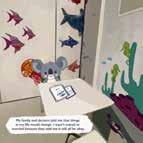



Fatima is literally my best friend; we do everything together. We like going out for days out in central London, we like going out for food, we do painting, and we have pet bunnies that we spend time with together.
The idea for the book came from a university project. I’ve just finished a degree in advertising and brand design and as part of the course, I was asked to create something I was passionate about.
I came to the realisation that my passion lays with helping people who don’t feel like they have access to the help that they need.
Then I looked at Fatima and how much being diagnosed with PH affected her, partly because she didn’t really understand what it was. So, it all stemmed from there.
KiKi herself is definitely a reflection of children with PH, so they don’t feel isolated, and so they can relate to someone else and not be the child that is ‘different’.
But she also becomes something bigger, in that she’s a support system for the family as well, and I hope the book can be used as a tool to have important conversations.
The book is aimed at children aged around three to nine. Readers can follow KiKi’s journey through learning how to cope with pulmonary hypertension and learning just how special KiKi is – just as they are too.
Because the book is based on my sister’s journey, KiKi is essentially Fatima in a koala bear. I chose a koala as the main


character because people think koalas are bears but they’re actually marsupials. That made me think of children with PH; just because they may look happy and healthy, it doesn’t tell the full story. It’s not always what you see on the surface; there can sometimes be more.
When I spoke to Fatima about what I was doing I think that she was very happy to finally have a say in how she was being portrayed, rather than being dictated by these stereotypes that you have when you find out you’re a child with a ‘condition’.


I would say that she is pleased and happy and excited to see where KiKi goes and how she grows. I hope that she grows with her, and I think she is proud of me for doing this.
I’m pleased to say that when the book was marked as part of my degree, I got a really good grade. But it’s been about much more than that; and I’m excited so see where this all goes. I will always refer to this as my ‘passion project’.

To find out more about Kiki the Koala, visit www.myphfamily.com


Maryam has created a range of KiKi merchandise to help children and families feel connected to a special community, which you’ll also find on this website.
Profits from all purchases are kindly being donated to the PHA UK.
Paul Sealey is planning to celebrate a year since his pulmonary endarterectomy by running the Cardiff Half Marathon –something he never thought he’d be able to do. The bus driver from Wales explains why fundraising for our charity will be a meaningful end to a tough journey with his health…



My symptoms started eight years ago, when I was 40. I discovered I had bilateral pulmonary embolism (blood clots) in 2015, and they kept recurring, which is what led to me being diagnosed with chronic thromboembolic pulmonary hypertension (CTEPH) in June last year.
I had the pulmonary endarterectomy - surgery to remove the clots - just a few months later in October.

I was a little bit apprehensive when the surgery was mentioned, but I didn’t feel there was a choice, if I wanted to live.
The symptoms had completely controlled my life for many years. I’m a bus driver and whilst I was fine when I was driving, because I was sitting down, I would dread going on my break because I’d have to walk.
My whole life was a real struggle and it kept getting worse as time went by.
By the time I had the pulmonary endarterectomy (PEA), the clots had calcified because they had been there for so long, and some were on the extremities of my lungs, so I was warned the surgery may not be able to remove them all. But they were all taken, so I was 100% cured by the operation.
I recovered really well from the PEA. I was told that I would be bed-ridden for a few weeks when I came out of hospital, but I was able to start going out very quickly.
Following my recovery, I wanted a way of forcing myself to improve my fitness. I had no stamina and even though the operation had been a complete success, I knew that building my fitness and my stamina back up would be hard.
I’ve never been a runner, so I thought that entering a half marathon would be a good way to push myself out of my comfort zone and give me an incentive to train. I also thought it would be a good opportunity to raise money for the PHA UK.
I was conscious not to over-do things, so I started by building up my stamina with walking, increasing my daily steps gradually. I also started using an exercise bike at home and lifting weights to help improve my strength.
I then started jogging in May and I will be training through the summer until the event in October.
I’ll be doing the half marathon with my son, Josh, who is 25. I’m really happy that he’s offered to run with me.

As a regular runner he won’t need to do much training as I’m setting myself a very realistic target. I aim to complete it in three-and-a-half hours, which isn’t much faster than walking. I’ll not be pushing myself too much.
The day of the run will be just short of a year since my operation and there’s a massive significance in that.
It means that in less than a year, I will have gone from having a life-saving operation to running a half marathon. It’s going to be a big personal achievement.”
The Cardiff Half Marathon takes place on 1st October. Paul is collecting sponsorship online at www.bit.ly/PaulCardiffHalf

As the cost of living continues to rise, find out what financial support you may be entitled to.


It’s been a few months since the launch of our dedicated email support service, and we’re proud that it’s already helped so many of our members.
We understand that not everyone is comfortable with using the phone, or there may be a physical or mental impairment which makes talking in this way a challenge. That’s why we wanted to provide a service that’s as valuable as a helpline, but delivered via email instead.
Contact us at support@phauk.org at any time and we’ll get back to you within two working days.
We can help with ongoing emails to support you through a difficult time, or with one-off enquiries

or problem-solving. We can also signpost you to other services if needed. Our e-support service is here for whatever you need, in a way that works for you. You’re not on your own.
Please note: We are not trained counsellors, and we cannot assist with individual medical advice. Your specialist PH team should always be your point of contact for queries of this nature. For anything else, we will always do our very best to help youand if we don’t know the answer, we’ll try and find out! Our aim is to get back to you as quickly as possible, but please be patient during busy periods.

“What a brilliant initiative, absolutely fantastic, my thanks and full appreciation to all involved in setting this up”
E-support service user
“I'm so grateful to have this chance to email as I'm hearing impaired”
E-support service user



This four-week self-help programme consists of a series of workbooks based on Cognitive Behavioural Therapy (CBT), to help you take control of problematic worry and anxiety.
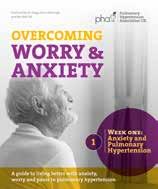


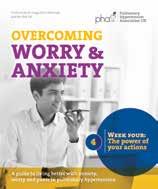
✓ Developed with a team of clinical psychologists
✓ Tried and tested by people with PH
✓ Complete in your own time at home
✓ Totally free of charge
100% of people with PH who tested the programme said it helped with their anxiety.
“When I received the booklets, I was determined to get the best out of them. I cannot express my gratitude enough. The clear explanations and easy-to-use strategies to cope with anxiety have been life-changing.” PHA UK member
Kenna Stewart will be thinking of her mum when she jumps from a plane to raise money for the PHA UK this summer.
She will make the leap at Fife Airport with friends
Donna MacLeod Bray and Donalda Mackinnon on 29th July, and together they are raising sponsorship for the PHA UK and Macauley College – a charity supporting people with autism and disabilities on the Isle of Lewis.

centre is happy”, she said. “I’m not sure if nerves or excitement will get the better of us on the day though. They may have to prise my fingers from the side of the plane when it comes to it!”
Kenna is sure that her mum Christina, who died with pulmonary hypertension in 2014, will be with them in spirit during the challenge.
“Mum would think that we’re off our heads for doing this, but she’d be very proud too. She was my rock and supported me all my life in everything I wanted to do. When the opportunity came up to do a skydive, I decided I wanted to raise money in her memory.”
Christina had been ill with complex symptoms for some time and was treated for connective tissue disorder and other conditions, before finally being diagnosed with PH. She died just a few weeks later.
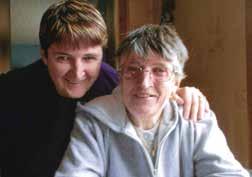
on a ferry when she was ten years old, which led to months of hospital treatment before both legs were amputated, one above and one below the knee. Her mum supported her through that journey and throughout her life, and the skydive is dedicated to her memory.
“This is just a small thing we can do", she added. "Anything to raise money and awareness to help others with earlier diagnosis of PH has got to be a good thing.”
Kenna’s husband Tommy (pictured below) will be jumping alongside his wife and her friends. He will be raising money for the Army Benevolent Fund, a military charity close to his heart..

The friends all live in the Western Isles of Scotland and although Kenna is a double amputee, she’s not letting that get in her way.
“My doctor has cleared me as fit to do it and so everybody at the skydive
“No-one in the family had ever heard of PH and we knew of no-one on the island who had it. It was a quite a shock when we learned more about the condition and just how serious it was.”
Kenna was involved in an accident
Holiday season is here! We know that whilst planning a summer break is exciting, finding travel insurance can be a headache. Hopefully this feature will help…

Obtaining travel insurance when you have PH can sometimes be difficult and costly – but it’s not impossible, and it’s really important.
Quotes very much depend on the individual and where you are travelling to. But when enquiring or purchasing your insurance, you must declare that you have pulmonary hypertension, even if it’s very stable.
You must declare any other pre-existing conditions too. It can be tempting not to, in order to keep the costs down, but it’s not worth the gamble. We’ve heard from members who have been unable to claim because they haven’t been honest, and therefore had to pay out lots of money..
On the right, we’ve listed some companies you might like to try. The British Insurance Brokers’ Association (BIBA) can also provide you with a list of insurers who cover people with PH. For more details, visit www.biba.org.uk or phone the helpline on 0870 950 1790.
Being over 80 and with PH, I found travel insurance difficult to find when I wished to go abroad last year. However, I found Goodtogo very understanding and easy to deal with.”
Geoffery, PHA UK member

Boxes of Sunshine is a registered charity, posting boxes of goodies to children and teenagers who have been nominated to receive a gift in this way.
The only criteria is that they must live with a long-term health condition, and here at the PHA UK, we’ve provided a grant to cover the cost of boxes sent specifically to youngsters with pulmonary hypertension.
The exact contents are kept secret, but they can include things like card games, bird seed, bubble bath, socks, and sweets – simple things, designed to raise a smile.
The thoughtful scheme was set up by Kev and Lynsey Hill, who lost their daughter Kirsten to Leukemia at the age of just 14.
She also suffered with chronic fatigue syndrome, and inspired by her request for a ‘box of sunshine’ as her final Christmas present, the pair founded the charity in her memory.
To nominate a child with PH to receive a box, visit
Founders, Boxes of Sunshine
Little phighter Connie Price received a box last month, and mum Jane said it ‘made her day’. The smile says it all!

We’re proud to be sponsors of a wonderful scheme that sends surprises through the post to young people living with chronic illness.
“Knowing how tough it can be to live with a chronic illness, we want to let these young people know that they're not forgotten, and that so many people care about them.”
Hill











It’s been 15 years since Tess Jewson was diagnosed with PH, and she refuses to let it define her.

It was 2008 when I was diagnosed with Pulmonary Hypertension with Eisenmenger’s Syndrome at the Royal Brompton Hospital in London.
I had no idea what PH was and nor did my parents. Our lives had been turned completely upside down. I was 17 years old, and I could only have months to live.
Looking back, I don’t really remember that much, except for having to go for many tests, and staying in hospital for around six months.
Over time, my medication has had to change to keep up with the increase of my PH symptoms. As I’ve got older, I have noticed that my symptoms have become more noticeable, mainly shortness of breath.
Whenever I have been put on a new medication, I have cried each time because it reminds me that PH is progressive, and I will slowly get worse. However, I know these meds are there to help me and I am so fortunate to have the opportunity to change to new ones.
Oxygen therapy has become more prominent in my life now and I always feel self-conscious having to wear it in public.
As many readers will know, I have done many campaigns about living with an invisible illness. But despite the challenges of living with PH as an invisible illness, I do still prefer it to be hidden. Of course, I am grateful to have oxygen to help me, but on a day where I feel I don’t need it 24/7, I will only use it when necessary.
Continued overleaf...
“PH is
With my mum and dad

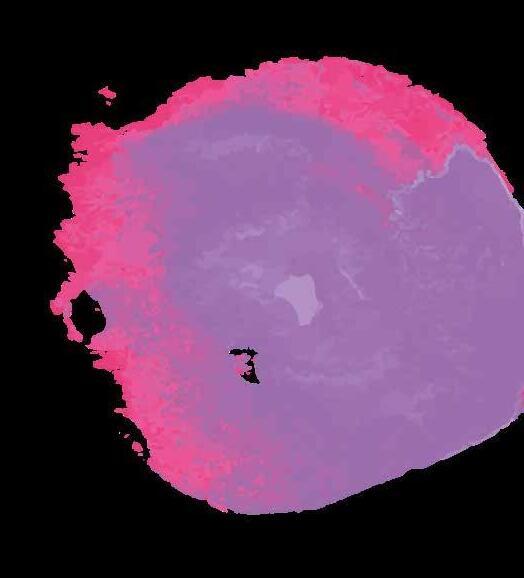
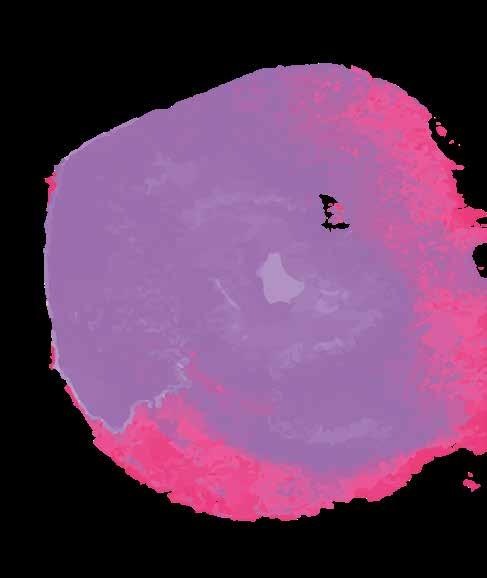
Our wedding day

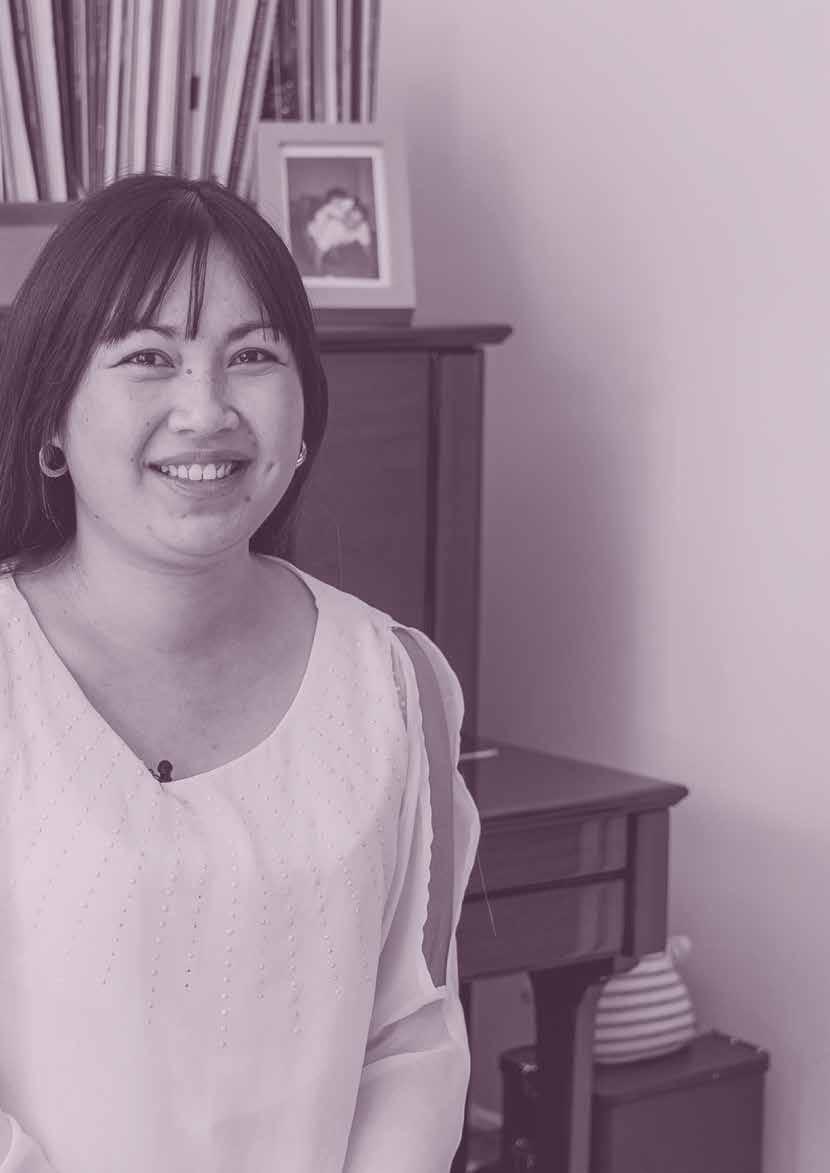
“My hope will always be finding a cure for PH, but for now I am happy and count myself lucky”
Since my diagnosis I am so lucky to have celebrated many key milestones and achievements.
kept in touch over FaceTime every day.
It was also the year my friends and I were all turning 30, but being mid-pandemic, all our big celebration parties were cancelled.
We were eventually allowed to form a ‘bubble’ and I celebrated with my mum, Terry and the dogs. Turning 30 was a massive milestone, especially after being told I may not reach my 18th birthday. I am always so grateful to reach and celebrate each birthday.
When it comes to education, I have been to university twice. In 2012 I graduated with a degree in Music and four years later I graduated with a Master’s degree in Music Therapy.

In 2014, I met my husband Terry, and three years later we got married, surrounded by our family and closest friends. It was a magnificent day and despite being insured up to the eyeballs in case anything happened with my PH, the day went perfectly.
Terry has embraced being with someone with PH, although at times it hasn’t been easy. I have been very poorly, but he continues to be my rock and support and as he says, ‘together we can do this!’
In the same year we got married we adopted a miniature poodle called Izzy and the three of us have gone on many adventures together.
In 2020, we all went through a pandemic. Being classed as vulnerable made it even scarier and I hated being away from my mum for so long, especially as she is on her own, but we

At diagnosis, I do remember feeling absolutely distraught at what was happening and asking the many questions of, why me? Why now? Will I die? It was a very dark time, but I knew deep down that I was determined to keep going and to follow my dreams of becoming a professional musician. Music has helped me through the ups and downs; when times are difficult, I will play my piano and cello for hours on end to make myself feel better.
I unfortunately had to stop playing the trumpet when I was diagnosed, as I didn’t have the breath and it was causing further damage to my heart. However, before diagnosis, I had travelled the world performing with my trumpet and cello in various orchestras.
Over the last 15 years I have had so much support throughout the highs and lows of my PH journey, and to thank everyone I’d end up being like someone at the BAFTA awards reeling off my list!
On a serious note, the PH team at the Royal Brompton are fantastic and I can’t write an article without doing a special shout out to PH nurse specialist Carl, who’s been supporting me since the day I was diagnosed.

My parents have been my absolute rocks since my PH diagnosis. I know it really hurt my mum and dad when I got
diagnosed, and they too experienced PH from the beginning with me. But their support and love never wavered, and together we have got through some really tough times.
We sadly lost my dad to motor neurone disease in December 2014, which was really difficult for all of us, but I was so happy that despite living with PH, I had shown him how much I had achieved. He knew though that I would always succeed, no matter what life threw at me.
My all-in-one husband, best friend and carer, Terry, continues to be my number one supporter and I have amazing support from my closest friends too. I am also so fortunate to have met and become friends with many inspiring and fantastic PH’ers.

And finally to the PHA UK, a huge thank you to you too. We are so very lucky to have such an amazing charity.
Continued overleaf...
Hospital visits have been a big part of my life
Oxygenhelps me when I need it

When I first got diagnosed, I started sharing my PH journey and writing about my experiences through a blog (www.phighter.co.uk).

It has been a wonderful outlet for me over the last 15 years and I have gained over 50,000 readers from across the world. I have learned there are people out there who support you and will have your back, even if they’re strangers living in another country.
However, I’ve also learned that taking time out from the online community is

also necessary too. I feel that PH can consume our lives, but we mustn’t let it control us.

Since the pandemic, I’ve changed careers to focus on my music therapy work. I still work for myself, and I love being my own boss, choosing my own hours around my health needs.

Music has helped me and my PH so much, that I too, wanted to help others in need and show them how music can benefit them. Some people think it’s difficult for me working with children with life-limiting illnesses, but from my experiences of living with PH, I feel my connection with the clients is that much stronger. It is such a rewarding career and I’m so pleased to have finally found my vocation.

My hope will always be finding a cure for PH, but for now I am happy and count myself lucky. Right now, I don’t have any big goals, but I do hope to stay as healthy as I can so I can continue to go on many adventures with Terry and Izzy.
If I could go back in time to 2008, I would say to myself, ‘yes, it’s going to be difficult, but there will also be some amazing times too’. 'I’d say It’s going
to be one hell of a ride, but there is always hope and there is always support. You may not feel it now, but things will be okay.’
When I am low, it sucks, and I have hit rock bottom. But you must remember your friends and family are your biggest supporters. Allow them in, and together you will get through it.
PH is a part of us, but it doesn’t have to be who we are. We can still live life to the full, despite having PH. Remember to always have hope.
“I have had so much support throughout the highs and lows of my journey”
With my beloved cello

Rhonda Masterson completed a 10km sponsored walk on what would have been her sister Shona's 40th birthday, raising over £1,000 in celebration of her life. Rhonda was joined by friend Esra for the challenge, and the pair carried a beautiful balloon in her memory.


Talented knitter Nicki Ross held a tabletop sale at a fete in her village, raising over £100 through sales and donations. Nicki has been making and selling knitted figures for us since the start of the year, and she now has a website for people to order her products from all over the world. Check it out at nickis-knitting.webador.co.uk
He did it! At the age of 74, Colin Ayrton completed his Land’s End to John o’Groats cycle challenge in a total of 20 days – raising over £4,000 including Gift Aid in support of his wife Carole. Colin was joined by his family for a get-together halfway up the country (pictured), but he cycled solo for the entire trip.

Staff at dental practice MJ Warren completed 50 skips a day during May in support of practice manager Michelle, who was diagnosed with PH a few months ago. Together, the team raised over £350
Meet our remarkable runners over the page >>>>>>

The remarkable runners who have been clocking up the miles for our charity







After obtaining ballot places, these runners pounded the pavements of the capital in the TCS London Marathon



Manuel completedMontero the course in spite of a knee injury, in support of his wife Stella.
Chris Spindler was joined by wife Sam for a well-earned beer at the finish line. The event bagged him 26.2 miles towards his goal of running 666 before the end of the year.



Sophie Morris had her friend Maddy in her thoughts all the way around.
Karen Doak used the eventtoprepareforher35-day runningchallenge (seepage52formoredetails!)
Graham Hewitt ran in support of his wife Jennifer. He is pictured with her in hospital in Sheffield, just 12 hours after completing the race in London.

After repeatedly being told he had asthma, 27-year-old Tom Packham was finally diagnosed with PH last year. This is his story of fighting for the right care, and trying to be the best dad and husband that he can.

Everything that I’m doing is for my family”
My symptoms started in August 2021, out of nowhere. I was working in Abu Dhabi, and I was becoming breathless even when I wasn’t doing anything. Because it’s so hot in the Middle East, I put it down to the humidity and didn’t think much more of it.
But when I returned to the UK a few months later, the breathlessness got worse, and it got to the point where I couldn’t walk more than 100 metres. I went to my GP, who diagnosed asthma and prescribed an inhaler.
There was a very slight improvement because the inhaler helped open up my airways, but of course it made no real difference. I knew for a fact it wasn’t asthma. It just didn’t sit right me with at all.
A couple of months later I blacked out whilst walking up the stairs and was taken to hospital as an emergency. Because I had gastroenteritis (a stomach virus) at the time, the medics put everything down to that and I was sent home after a few hours.
Things then started to get really bad. I couldn’t walk more than ten metres outside my house without feeling dizzy, and although I kept on working, it was a real struggle. My job involved heavy lifting and ladders, and I was almost passing out when I climbed down from them. I would get palpitations and start sweating and feeling clammy. It was like a heart attack.
I would repeatedly break down after getting home from work because it was terrifying, and so emotionally draining too. It got to the point where I thought ‘I’m not going to live until next year’. I just thought, ‘I’m not going to survive’.
I kept having appointments with my doctor to tell them it wasn’t getting better, but it didn’t make a difference. The inhalers obviously weren’t helping, and it was really frustrating. I was told that perhaps I wasn’t using the inhaler properly, and that’s the way it went for almost a year.
The diagnosis of pulmonary hypertension eventually came in November 2022. After a particularly frightening episode at work, when I couldn’t breathe, my wife Hannah insisted we went back to the doctors. I told them I didn’t think I would be alive next year, and luckily they agreed to me having an echocardiogram (ECG) at the surgery the very next day.
After checking the results, I was told to get to a hospital straight away and I spent nine hours in the A&E department in Blackpool. They did all sorts of tests, and I was asked constantly whether I had been taking cocaine or other drugs. They said my heart was inflated and they didn’t know why.
I stayed in hospital for a further two weeks and I am grateful that one of the doctors suspected something different and decided to do a right heart catheter test, which confirmed idiopathic pulmonary hypertension. I Googled it, and life turned upside down.
I got transferred to the specialist centre in Sheffield, where I started treatment. I’ve gone through different therapies to find what works best, and it’s really made a difference.

I’ve been trying to learn more about the condition over the last few months, but I’m still struggling with it all to be honest. I always say that if it was something I did that caused the PH then I could accept it, but because it’s so rare
and it has randomly happened, I can’t really get my head around it.
Many of my friends still don’t understand PH because I’ve always been fit and never struggled with anything, then all of a sudden I was on death’s door.
I remember a family member saying, “I can’t see anything wrong with you, so I don’t understand how it’s this bad” – and that’s the problem.
I’ve got two children, Lucas who is seven and Amelia who is four, and I try and play with them as much as I can. My treatment means I don’t get as breathless as I used to, but even on good days I get tired.
I don’t want my kids to go through life without a proper father there. I want to do as much as I can and keep everything ‘normal’, as it was before.
Without them and my wife being there to support me, I don’t know what I would have done to be honest. Everything that I’m doing now is for my family.
When I look back on how long it took to get my diagnosis, I think it’s awful. If I had to sum up the last couple of years, I’d use the words ‘emotional’ and ‘disastrous’. I’ve not had a good time, that’s for sure.
In terms of the future, I’m feeling optimistic, but uncertain too, because I don’t know what’s going to happen. I have had a transplant consultation, but at the moment I’m too well to be considered for one. I do count myself lucky that I’m in a decent situation right now.
In terms of the future, I’m feeling optimisticTom and wife Hannah
nutrition feature to help you make the most of life
In last issue’s article, I spoke about calories and what they are, and this topic of ‘energy balance’ follows on nicely from that.
Energy balance refers to the balance between the calories we consume through food and the
calories we burn through physical exercise and activity, as well as our basic metabolic processes.
When we consume more calories than we burn, we are said to be in a positive energy balance, (this can also be called a surplus) – which can lead to
weight gain. Conversely, when we burn more calories than we consume, we are said to be in a negative energy balance – which can lead to weight loss.
Many people believe that weight gain or loss is simply a matter of eating too much or too little.

However, the body is much more complex than that. The number of calories we burn each day depends on many factors, including age, gender, weight, height, and level of physical activity.
For example, your average office worker (like me) will burn fewer calories each day than a typical tradesman who is on their feet for hours each day. So, the tradesman will find it harder to gain weight, but easier to lose it, because their daily activity will most likely be higher.
Additionally, our bodies are constantly working to maintain everything that goes on inside them, which means that our basic metabolism is very specific to the individual.
To achieve and maintain a healthy weight, it's important to be mindful of both the calories we consume and the calories we burn. This means making smart food choices and engaging in some sort of activity (if you can).
One effective way to manage caloric energy balance is to track our daily calorie intake and physical activity using a food diary or smartphone app. This can help us identify areas where we may be consuming more calories than we need and make adjustments accordingly.
Physical activity does play an important part in managing caloric energy balance, but if you’re limited in this area, this can be mitigated by consuming fewer calories.
Engaging in regular exercise can increase the number of calories we burn each day and help us achieve a negative energy balance. This can include activities such as walking, cycling, swimming, or even some form of strength training. Importantly though, it’s about whatever you can manage and whatever you enjoy!
To wrap up, energy balance is a key factor in maintaining a healthy weight. By being mindful of both the calories we consume and the calories we burn, we can achieve a healthy balance and improve our overall health and wellbeing.
We’d like to say a big thank you to everyone who has completed our survey to understand more about PH and nutrition.
Paper copies were included with the last issue of this magazine, and many of you completed the questionnaire online too. We’ve had over 600 completions, which shows that you care about this topic as much as we do.
This pioneering survey is the first ever to dig deeper into the eating habits of people with PH, and to uncover the areas where support is needed.


The insight it provides will help us produce the right resources and support systems to help improve quality of life through nutrition, and we’re hopeful of making a real difference thanks to your help.
We are in the process of analysing the findings and we’ll bring you a report in the next issue of Emphasis.
Early analysis is already helping to guide our work in this area. In fact, the expert columns you see in this feature are in direct response to the things you told us you wanted to know more about. There will be much more on this coming soon.
If you have a question about food and PH, email nutrition@phauk.org and Shaun will happily provide some guidance.
Here, Chermaine Kwant, a registered dietician who had PH before undergoing a lung transplant, shares her advice.

Symptoms of PH can reduce your appetite, and fluid retention can make you feel full very quickly when you eat. It can also be a problem when medications cause nausea or digestive problems. What we see very often is also that patients don't have the energy to eat after a very busy day, or even after preparing the meal itself.
A lot of medication requires you to eat something when you take it, and that can be hard when the medication itself can make you feel nauseous.
But although it sounds contradictory, you must eat in order to prevent becoming nauseous with the medication.
It can be tempting to eat unhealthy things when you don't have a lot of appetite, but that won't do your body any good. You may want to reach for a candy bar because it’s easy, but it’s important to eat as healthily as possible so that you make your body stronger.
If you have a reduced appetite, it might be better to eat a few smaller meals throughout the day rather than the three ‘set meals’ of breakfast, lunch and dinner.
Don’t worry about timings, just eat when you have the energy. If it’s better for you to eat your ‘main meal’ during the day, that’s fine. If you’re already tired from a busy day, then eating and digesting a big meal in the evening can be too much.
Sipping a small cup of broth (the ‘stock’ that’s often used as the base of soup, such as the water from boiling the bones of a meat joint) before a meal can help elevate your appetite.
It also helps to avoid very heavy food. For example, choose steamed vegetables over mashed potatoes and gravy. It is important to cook vegetables, as raw vegetables have more fibre, and this make you feel fuller more quickly.
REDUCED APPETITE, NAUSEA, AND HEARTBURN ARE ALL THINGS THAT YOU CAN EXPERIENCE WHEN YOU HAVE PH – AND WHEN YOU HAVE TO COMBINE MEDICATION WITH FOOD, WE UNDERSTAND IT CAN BE DIFFICULT.
If you want to eat something small with your medication, then a few nuts combined with a piece of fruit is good. Bananas especially are quite easy to digest. I would advise avoiding melon however, as this is not as easy to digest as other fruits.
Another option could be a boiled egg, or a slice of toast with butter. Soup is also good, but although this is light on your stomach, be mindful that if you are on restricted fluids, it adds to your daily fluid intake.
My tip here is to drink herbal tea. Ginger or fennel are best, and fennel is also a vegetable that you can slice into a salad. It's got a very nice flavour and it’s very good for your stomach.
If you have trouble digesting your meals, especially if you have heartburn, then my tip is to avoid drinking fluids when you eat.
Every time you drink, the liquid lowers the amount of stomach acid and the less stomach acid you have, the more problems you will have when digesting the meal. I understand it might sound strange, but this is a really good tip to try.
If you haven’t got the appetite or energy to eat, then sometimes it might feel very easy to take a meal replacement shake instead. However, they are highly processed and often contain things on the ingredients list that you can’t even pronounce.
They contain a lot of additives and often a lot of sugar. You need to avoid processed foods in general, whether you have PH or not – but especially if you have cardiovascular disease.

I filmed a video with the PHA UK earlier this year about quick and easy one-pan meals, so watch this at www.bit.ly/one-pan-meals and it might give you some alternative ideas.
Everybody is different, and everyone reacts differently to certain ways of eating and drinking, so my advice is to try some of the tips above and see if they work for you. Ultimately, it’s important to become more aware of what nutrition does to your body.
Chermaine Kwant is sharing her expertise as part of our partnership to help people enjoy a better quality of life with PH.



We also have limited availability of these...
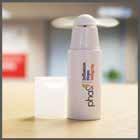










Shop now at phauk.org/shop or scan this code with your phonemobile

Our Listening Line support service gives you dedicated time with a PH professional to discuss your worries or concerns.

• Free and confidential
• An impartial listening ear
• Available to all PHA UK members, family and friends too
Talking to someone who already understands PH means you don’t have to explain your condition first.
Find out more or book an appointment by emailing listeningline@phauk.org or calling 01709 761450
Appointments can also be booked via our website at www.phauk.org
Calls take place with Paul Sephton, a former clinical nurse specialist in PH. Paul has many years of experience supporting people affected by pulmonary hypertension, both in a clinical environment and as part of the PHA UK team.

“Paul’s support lifted me. He was so understanding and supportive, and it was helpful to chat with someone who knows about this disease.”
PHA UK member This is not a formal counselling service and it is not designed to replace clinical advice from your specialist centre team.Getting outside is great for our health, and gentle exercise is proven to be good for people with pulmonary hypertension. Why not look out for these things to collect on a nature walk with your family? Tick them off as you find them!
What’s the biggest one you can find?
These come in all shapes and sizes, can you find one that’s colourful or smooth?
Buttercups and daisies are two types of wildflowers you might spot this summer.
Ask a grown-up to help you identify what bird it may have come from
There won’t be many on the ground during summer, but keep an eye out for bushes and low-hanging branches.
Empty egg boxes are great for collecting small things in while you’re walking!
If you’re visiting a beach for your walk, keep an eye out for these treasures!
n A shell
n A piece of seaweed
n A piece of driftwood
n A brightly coloured pebble
Takingamagnifyingglass onyourwalkwillhelpyou studysmallthingsup-close
Lots of people, including me, think that sport is fun, but having PH can sometimes get in the way a bit with what I want to do. Not only is sport fun, but it is also good for us and I think it’s important to be as fit as possible, especially when you have PH.
I love a range of sporting activities, including netball, basketball, badminton, dance and swimming. At the moment, I go to a dance club during one lunchtime each week at school and I do an hour-long dance class as part of my Stagecoach session on a Saturday. I also train with the school netball club after school on Tuesdays and do a two-hour PE lesson every week in school. Before Easter we did basketball in PE lessons and the summer term will be athletics, and I am looking forward to that a lot.
Having PH means that I get out of breath more quickly than my friends when doing things like running, jumping and anything that needs a lot of energy, especially if I need to keep going. Taking my medications definitely helps and I notice that I am more breathless if I forget to take a dose of pills. I find that my breathlessness varies throughout the year, and I think that I am worse in spring and sometimes the summer and that it may be to do with pollen.
I know that I have to be careful not to push myself too hard. It’s OK to be out of breath, but I shouldn’t get to the point of having chest pain or
Young Emphasis columnist Emily is 11 years old, and she has had pulmonary arterial hypertension (PAH) since she was three. This issue, she tells us how she manages to enjoy sport and physical activity.


 by Emily Gravenstede
by Emily Gravenstede
being dizzy. So, my PE teachers and dance teachers know that if I stop, or change moves so I am doing a bit less, this is just so I can be OK and keep going. For example, in dance, I do less exaggerated movements and less jumping moves during the warm-ups and practices. In netball, I do the same, and if I need to I might walk when the others are running. It is harder to adapt during games of netball because I really want my team to win. I tend to play in a position that has the least running (goal shooter or goal keeper) and sometimes I play as an extra player – so I can do what I can, but am not responsible for marking a particular position. I just go to practice, and I don’t play in competitive matches anymore, but I still really enjoy netball.
Have fun, enjoy sport, but don’t push yourself too hard!
Emily xFor many years, we’ve invested in technology that supports people with visual impairments and hidden disabilities to access our content in a way that works for them.
Our assistive toolbars will:
Read the on-screen text aloud
Translate words to a language of your choice
Simply tap this button at the top of each web page to access these features!
Give it a try at www.phauk.org

www.phocusonlifestyle.org
Display the meaning of words through illustration
Convert online content into MP3 files for easy listening
Generate a reading panel to reduce visual stress and improve focus

Magnify text size
Simplify how a webpage looks to remove distracting content











Karen and her partner Paul have taken on many physical challenges together – but this one will be extra special.
The pair in their younger years
Just as this magazine went to print, Karen Doak set off to run the entire length of the UK for our charity – all in support of her best friend.
1000 MILES MILLION STEPS
Although Karen is no stranger to long-distance running, even she admitted that over 1000 miles might be challenge.

On 3rd June, the sports massage therapist from Norwich began an epic journey from Land’s End in Cornwall, and she’ll be covering 50km each day (more than a marathon!) until she reaches John o’Groats in the far north of Scotland in July.
‘Run Britannia’ is due to take a total of 35 days, covering over 70,000 feet of elevation along some of the UK’s most famous long-distance trails and paths. It’s a longer route than if it consisted only of roads – but the sights will be second-to-none.
When the going gets tough, Karen will be thinking of her best friend Wendy and the strength she has shown since being diagnosed with PH a couple of years ago.


“We’ve been friends since we were eight years old and she’s definitely an inspiration”, said Karen, speaking to Emphasis before she set off.
“Wendy’s waiting for a lung transplant, she’s got a line into her heart and she’s on oxygen 16 hours a day, but she remains so upbeat and positive.”
Karen will be joined on her journey by partner Paul Saunders, who is raising money for the Seafarers’ Charity. Like many great plans often are, the idea to run the length of the UK was cemented in the pub – and it was booked before they could change their minds.
Run Britannia is a major physical and logistical undertaking, and the entire distance isn’t often covered on foot in one go. But Karen and Paul have completed many long-distance running events (with photographic evidence opposite!) and they have spent the last couple of years training hard for their biggest challenge yet.
“It’s going to be the adventure of a lifetime", added Karen. “Wendy was over the moon when I told her I’d be supporting the PHA UK in her name, and I’m certainly looking forward to the feeling of achievement at the finish.” .
Often, we focus so intensely on benefits such as Personal Independence Payments (PIP), Disability Living Allowance (DLA) or Employment and Support Allowance (ESA) that others may get forgotten about. In this series, starting with Attendance Allowance, I’ll be aiming to highlight some of the lesser-known benefits that are potentially available to you and your family.
Attendance Allowance is extra money if you have a long-term physical or
Shaun

mental condition or disability.
As with with all benefits, it’s based on what you can do as an individual, so just because you have PH it doesn’t necessarily guarantee you’ll be applicable – but I would certainly advise you to try.
Crucially, it is a benefit aimed at those who are of state pension age (66+) and who need help with their personal care, or for someone to
come in to help in other ways.
One of the great things about this benefit is that it isn’t means tested, so it doesn’t take your current savings or income into account, just your physical or mental ability. This also means that if you are a carer for someone with PH and you have a disability yourself, you can claim Attendance Allowance and it will not impact any carer benefits you may be receiving.
There are two payments based on your needs. At the time of writing this (May 2023) they are:
Higher - £92.40 per week
Lower - £61.85 per week
You will receive the higher rate if you need help or supervision from someone during the day and night, or if you are terminally ill (PH rarely comes under the bracket of terminally ill in this instance though).
You will receive the lower rate if you need frequent help or constant supervision during the day or night; not necessarily both.
You can claim Attendance Allowance if all the following apply:
• You have a long-term physical or mental illness or disability
• You have needed help with your personal care (for example, washing and dressing), or supervision to keep you safe, for at least six months before claiming
• You’re over State Pension age (66) You may qualify for Attendance Allowance if you need help with personal care or supervision to keep you safe. What matters is that you need help, not whether you’re currently getting any. Attendance Allowance is paid at a lower or higher rate, depending on the level of help you need.
Personal care includes help with things like:
• getting in and out of a chair
• bathing and washing
• dressing and undressing
• help with medication and treatment
• getting in and out of bed and sleeping
• communicating
• eating and drinking
• using the toilet
• seeing - ie. if you need someone to see for you
• breathing
• walking
Here are some examples of the help you may need (I’ve intentionally made them about things other than PH to prompt you to consider other ailments that could support your claim):
• You have arthritis which makes moving difficult, so you need help getting in and out of bed, washing and dressing, and getting in and out of chairs.
• You are deaf, and need an interpreter when communicating without sign language and to interpret spoken announcements.
• You have a mental illness and need prompting to look after yourself and do things such as take your medication, eating, washing and dressing.
• You are visually impaired and need help choosing clothes to wear, using the oven safely and preparing food.
• You have a learning difficulty and need help with managing your money, writing letters and looking after your health and hygiene.
Supervision means you need someone to check on you regularly to keep you and/or others safe. For example, you may need checks if you have memory loss, are at risk of falling, have seizures, or aren’t aware of potential dangers. Being left unsupervised may mean you fall, leave the gas on, self-harm, or are violent towards others.
To make a claim for Attendance Allowance, you must fill out a form. You can get a form by calling the Attendance Allowance helpline on 0800 731 0122 (textphone: 0800 731 0317 ), or by visiting GOV.UK and searching for Attendance Allowance
In Northern Ireland, contact the Disability and Carers Service on 0800 587 0912 (textphone: 0800 012 1574 ) or visit nidirect.gov.uk
If you call up for a form, it will be noted with the date you called. If your claim is successful, it will be back-paid from this date (as long as you return the form within six weeks). If you download a form and post it, your claim will start from the date it’s received by the Department of Work and Pensions.
Last year, PHA UK members were invited to take part in a research study to see whether ‘self-compassion’ can aid better understanding of the impact of PH. Patients and carers volunteered their time and experiences, and the results will now guide the development of support mechanisms to help people cope with the disease.
Dr Gregg Rawlings, who led the research, to find out more…
“We know that living with PH can negatively impact on people’s mental wellbeing. For example, people can be at a higher risk of experiencing anxiety and low mood (also known as depression), which can affect their health-related quality of life. Health-related quality of life is a term used to describe how someone perceives their physical and psychological health, and social wellbeing. We also know that people who support individuals with PH, sometimes referred to as carers or caregivers, can also experience anxiety, depression and strain associated with supporting their loved one with PH. This is sometimes called 'caregiver burden'.
There is a lot of research which has
shown that self-compassion can be related with depression, anxiety, health-related quality of life, isolation and stress in people impacted by long-term medical conditions. There is even a type of psychological treatment called Compassion Focused Therapy (CFT), which focuses on helping a person develop compassion to themselves and others as a way of coping.
Self-compassion can mean different things to different people. We use it for the purpose of our study to mean being kind to yourself and not judging yourself negatively. It can mean talking about your thoughts and emotions, rather than bottling them up or pretending they do not exist. Self-compassion can also mean acknowledging that experiencing difficulties is a normal experience and a part of being human, and it is not a reason to be unkind to yourself or isolate yourself from others.
In our study, we wanted to see whether self-compassion can help us to better understand the impact of PH on people with the condition and those who support this group of individuals.”
How novel is this research?
Has it ever been studied in PH before?
“This is the first time that self-compassion has been investigated in PH. This research adds to the growing number of studies that have looked at how psychological factors, such as our thoughts, emotions and behaviours, can interact with PH. It is of course important for treatments to target the condition itself, but this body of research is showing how it is also important for treatments to consider the emotional wellbeing of people affected by PH.”
“The study was open to people over the age of 18, either living with PH or supporting someone with PH. In total, 65 people with PH and 29 caregivers were involved in the study.
People were first asked to read a short summary of the study before providing consent to take part. They were then given some questionnaires to complete, which included questions about their demographics (such as age and gender), experiences of anxiety and depression, and whether they have been
acting self-compassionately.
People with PH were also asked to complete a questionnaire about their health-related quality of life, and carers were given a questionnaire on caregiver burden.”
What did the findings show?
“We found that both groups, people with PH and carers too, scored high on symptoms of anxiety and depression. We were especially surprised at the high rate of anxiety and depression in carers, which is something we want to look at in more detail in a future study.
We found self-compassion was related to anxiety, depression and health-related quality of life in individuals with PH and caregiver burden in carers. In other words, people who were more self-compassionate reported fewer difficulties with their emotional health and wellbeing.
When we looked at the results in more detail, we found in people with PH, those who were more judgmental of themselves experienced greater isolation, and were more likely to focus on or become preoccupied by their difficulties. They experienced more symptoms of anxiety and depression and lower health-related quality of life. We found something similar amongst carers.
However, the data also showed that people who were kind to themselves, who were more open to their difficulties, and who recognised that having problems is a common human experience - not a reason to be unkind to themselvesreported fewer symptoms of anxiety.”
“The findings help us to understand what can support people with PH and carers to cope with the impact of PH. This can help when trying to identify people who may be more at risk of experiencing difficulties.
For instance, people who are not being compassionate to themselves may be more likely to be experiencing problems
with their emotional wellbeing. The findings can also help to guide treatments. For example, if we know what is helpful (and what is unhelpful), we can share this information with others and use it to inform what type of support people can receive.
Based on our findings we can suggest how not being compassionate towards yourself may cause or make worse some of the difficulties caused by PH. For instance, people who negatively judge themselves may be more likely to experience low mood and isolate themselves from others. We know that feeling isolated can cause loneliness and make people feel unsupported. This can then cause anxiety and greater symptoms of low mood, meaning that people may be more likely to think negatively about themselves. This can then create what is known as a negative cycle, where people’s difficulties get worse over time.”
“We were especially surprised at the high rate of anxiety and depression in carers, which is something we want to look at in more detail in a future study.”
“The support we received from members of PHA UK in response to this study has been fantastic. By taking part in research studies, you are helping us to understand the condition better and improve the support people impacted by PH receive. We want to thank everyone who took part for their time and for sharing their experience and knowledge with us.”
Dr Gregg Rawlings

Tell our readers about any aspect of your journey with PH. We like to include experiences from both loved ones and carers.
Found something that makes life with PH a little bit easier? Contact us with your recommendations, findings, and nuggets of advice, so we can share them with others via these pages.

Want to comment on something you’ve seen in Emphasis, or share an opinion or feedback for print? Write us a letter or send us an email – you’ll find the addresses at the bottom of the page.
We love to celebrate the talents and achievements of our readers. Send us something that has made you smile, something you’re proud of, or something you want to share with others. This is a great way for children to get involved and see themselves or their work in print too.
If you’d like to see a topic covered in this magazine, or you have an idea for an interview, send us your suggestions.
Contact us here at Emphasis by emailing media@phauk.org or writing to Emphasis, PHA UK Resource Centre, Unit 1, Newton Chambers Road, Thorncliffe Park, Chapeltown, Sheffield S35 2PH
Your next issue will arrive in September
Don’t forget to tell us if you’rehouse!moving
